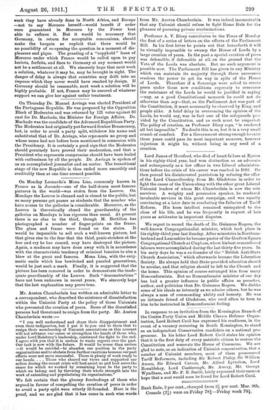Professor A. V. Dicey contributes to the Times of Monday
the first of a series of letters on the effects of the Parliament Bill. In his first letter he points out that henceforth it will be virtually impossible to swamp the House of Lords by a large creation of peers. In the past a special creation of peers was defensible, if defensible at all, on the ground that the Veto of the Lords was absolute. But no such argument is possible now. The Parliament Bill has given to any Ministry which can maintain its majority through three successive sessions the power to get its way in spite of the House of Lords. Therefore if a Sovereign were asked to create peers under these new conditions expressly to overcome the resistance of the Lords he would be justified in saying —nay, as a good Constitutional monarch he could not do otherwise than say—that, as the Parliament Act was part of the Constitution, it must necessarily be observed by King and people alike. A brief delay in overcoming the opinion of the Lords, he would say, was in fact one of the safeguards pro- • vided by the Constitution, and as such must be respected. The policy of creation, as Professer Dicey says, " is rendered all but impossible." No doubt this is so, but it is a very small crumb of comfort. For a Government strong enough to exist three years could pass its most important measure, however injurious it might be, without being in any need of a creation.


































 Previous page
Previous page